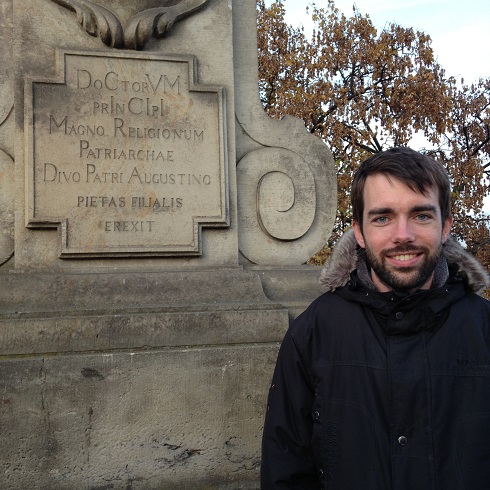Introducing the ESRs II - Morten Koch Møller
Morten Koch Møller studies the theological anthropology of Origen and Augustine at Charles University in Prague. In this report, he presents his research topic and his experiences with life in the capital of the Czech Republic.

Origen, Augustine and Charles IV
- Morten Koch Møller
On Prague’s arguably most famous landmark Charles Bridge, the 14th century stone bridge named after the
Holy Roman Emperor Charles IV, there stands an impressive statue dedicated to Augustine of Hippo (354-430). If you manage to run the gauntlet through the hordes of tourists that usually flock the bridge armed with selfie-sticks and succeed in arriving at the statue of Augustine, you will find a Latin inscription that reads: “Filial piety erected (this statue) to the first among teachers, the great patriarch of religion, the divine father Augustine.” This inscription illustrates very well the great esteem in which the North African bishop has been held in Western history. Here in Prague, a former capital of the Western Roman Empire, the “divine father Augustine” also makes his presence felt.
Christian anthropology in the making
As one of the fourteen ESR’s taking part in the research project “The History of Human Freedom and Dignity in Western Civilization,” I have the privilege of studying the writings of the influential Christian theologian Origen of Alexandria (185-254) and in particular his thoughts on human freedom and dignity. My specific subproject (No. 1) in our Innovative Training Network (ITN) deals with Origen’s thinking on these fundamental questions area in relation to the views of Augustine. Due to Augustine’s great authority in the Western theological tradition, his views on the dignity of human beings and the possibilities of the human will have been very influential and still are. One could even argue that Augustine’s somewhat pessimistic description of human life almost became the “default” position in Western Christianity. Not least for that reason, it is important to realize that Augustine’s position was by no means unchallenged in the early Christian centuries. Augustine’s views differ quite significantly from those of Origen. The latter presents a more optimistic account of human life and consistently defends the notion that the human will is free.
Paul – an advocate of freedom or a teacher of grace?
As a project of the magnitude delineated above could easily get out of hand, I have decided to focus on Origen’s and Augustine’s interpretation of Paul’s Letter to the Romans. Augustine’s reading of the Apostle’s letter had a decisive impact on this mature view of the relation between divine grace and the human will. Several scholars have argued that especially Augustine’s interaction with the ninth chapter of the Letter to the Romans caused a major shift in his thinking on these issues. This shift led to an emphasis on grace to the detriment of the human will. Prior to this, Augustine’s views on human freedom (and his interpretation of Romans 9) were remarkably similar to those of Origen. As a part of my research, I would like to investigate whether these peculiar similarities are just a coincidence due for example to a common philosophical outlook, or whether the early Augustine was actually influenced directly by Origen’s Commentary on the Letter to the Romans at first but later abandoned some of Origen’s exegetical conclusions. In his Commentary, Origen consistently understands Paul’s statements in a manner compatible with the notion of human free will.
My “beata vita” (happy life) in Prague
Prague, of course, has a lot more to offer than statues of Augustine and well-equipped theological libraries. The Protestant Theological Faculty where I study is located in the part of the city center called “New Town” (Nove Mesto) that was established by Charles IV back in the 14th century. So it is a very convenient starting point for strolls in the very heart of Prague. The city has so many interesting places to see as well as many cultural offers such as concerts. The Czech cuisine has been a pleasant surprise for me with its curious “knedlíky” (bread or potato dumplings), goulash and quality beer. It is hard not to like a country where beer pretty much costs the same as mineral water in pubs and restaurants!